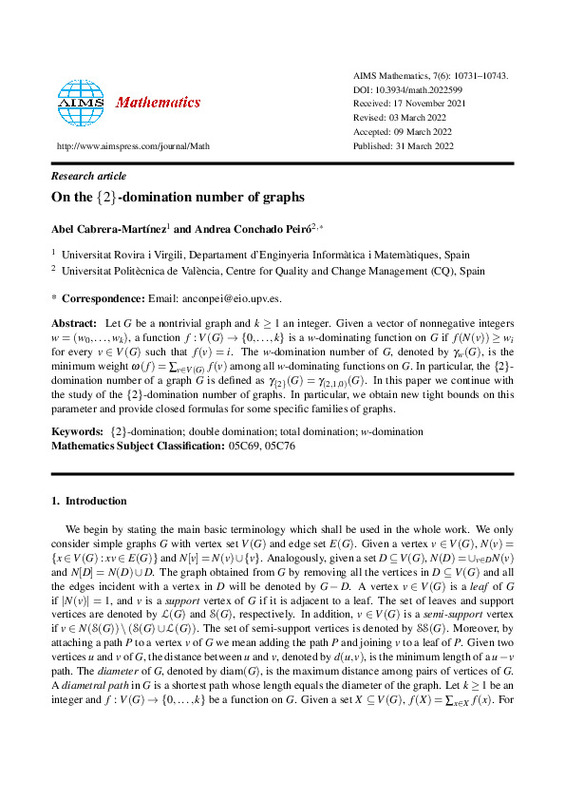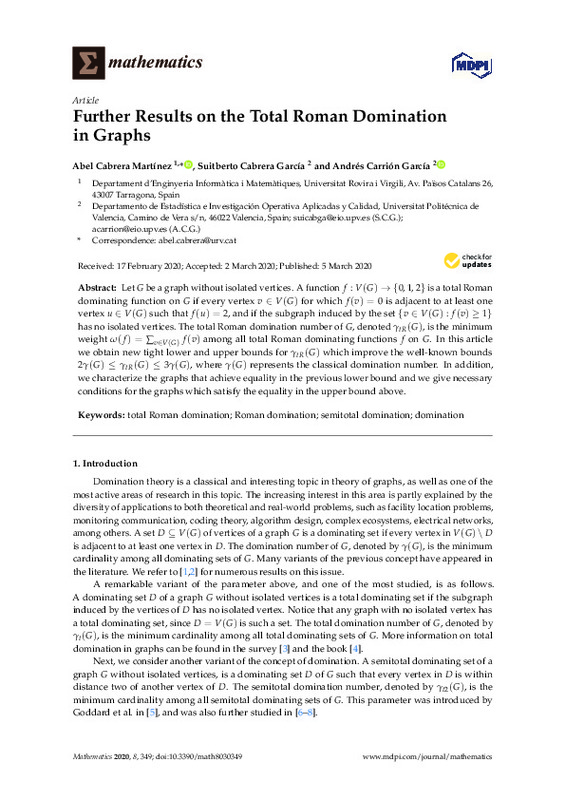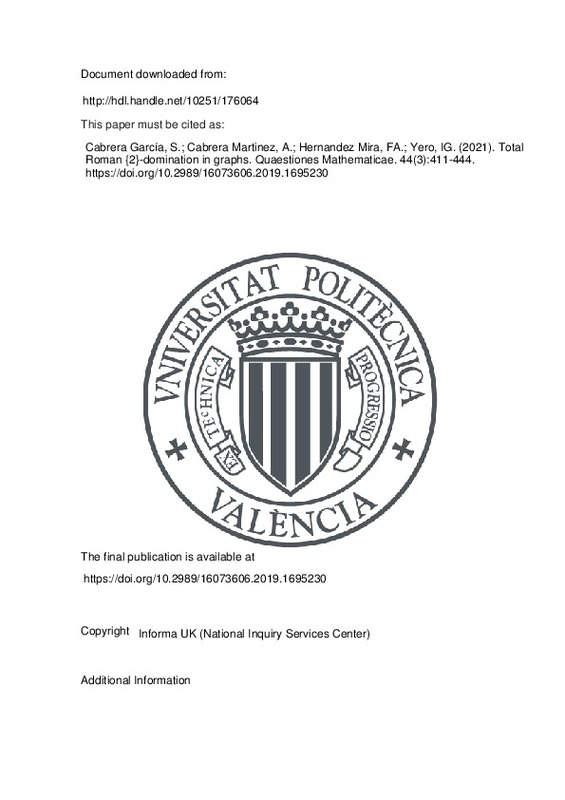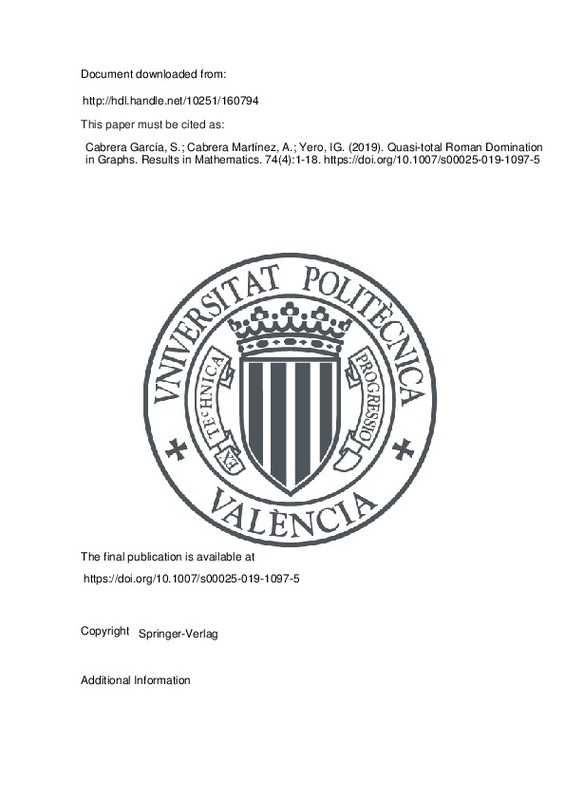JavaScript is disabled for your browser. Some features of this site may not work without it.
Buscar en RiuNet
Listar
Mi cuenta
Estadísticas
Ayuda RiuNet
Admin. UPV
On the {2}-domination number of graphs
Mostrar el registro sencillo del ítem
Ficheros en el ítem
| dc.contributor.author | Cabrera-Martínez, Abel
|
es_ES |
| dc.contributor.author | Conchado Peiró, Andrea
|
es_ES |
| dc.date.accessioned | 2023-06-12T18:01:26Z | |
| dc.date.available | 2023-06-12T18:01:26Z | |
| dc.date.issued | 2022-03-31 | es_ES |
| dc.identifier.uri | http://hdl.handle.net/10251/194102 | |
| dc.description.abstract | [EN] Let G be a nontrivial graph and k ¿ 1 an integer. Given a vector of nonnegative integers w = (w0,...,wk), a function f : V(G) ¿ {0,..., k} is a w-dominating function on G if f(N(v)) ¿ wi for every v ¿ V(G) such that f(v) = i. The w-domination number of G, denoted by ¿w(G), is the minimum weight ¿(f) = ¿v¿V(G) f(v) among all w-dominating functions on G. In particular, the {2}- domination number of a graph G is defined as ¿{2} (G) = ¿(2,1,0) (G). In this paper we continue with the study of the {2}-domination number of graphs. In particular, we obtain new tight bounds on this parameter and provide closed formulas for some specific families of graphs. | es_ES |
| dc.language | Inglés | es_ES |
| dc.publisher | American Institute of Mathematical Sciences | es_ES |
| dc.relation.ispartof | AIMS Mathematics | es_ES |
| dc.rights | Reconocimiento (by) | es_ES |
| dc.subject | {2}-domination | es_ES |
| dc.subject | Double domination | es_ES |
| dc.subject | Total domination | es_ES |
| dc.subject | W-domination | es_ES |
| dc.subject.classification | ESTADISTICA E INVESTIGACION OPERATIVA | es_ES |
| dc.title | On the {2}-domination number of graphs | es_ES |
| dc.type | Artículo | es_ES |
| dc.identifier.doi | 10.3934/math.2022599 | es_ES |
| dc.rights.accessRights | Abierto | es_ES |
| dc.contributor.affiliation | Universitat Politècnica de València. Escola Tècnica Superior d'Enginyeria Informàtica | es_ES |
| dc.description.bibliographicCitation | Cabrera-Martínez, A.; Conchado Peiró, A. (2022). On the {2}-domination number of graphs. AIMS Mathematics. 7(6):10731-10743. https://doi.org/10.3934/math.2022599 | es_ES |
| dc.description.accrualMethod | S | es_ES |
| dc.relation.publisherversion | https://doi.org/10.3934/math.2022599 | es_ES |
| dc.description.upvformatpinicio | 10731 | es_ES |
| dc.description.upvformatpfin | 10743 | es_ES |
| dc.type.version | info:eu-repo/semantics/publishedVersion | es_ES |
| dc.description.volume | 7 | es_ES |
| dc.description.issue | 6 | es_ES |
| dc.identifier.eissn | 2473-6988 | es_ES |
| dc.relation.pasarela | S\490896 | es_ES |
| dc.contributor.funder | Universitat Politècnica de València | es_ES |
| dc.description.references | T. W. Haynes, S. T. Hedetniemi, P. J. Slater, <i>Fundamentals of Domination in Graphs</i>, Chapman and Hall/CRC Pure and Applied Mathematics Series, Marcel Dekker, Inc. New York, 1998. | es_ES |
| dc.description.references | T. W. Haynes, S. T. Hedetniemi, P. J. Slater, Fundamentals of Domination in Graphs: Advanced Topics, Chapman & Hall/CRC Pure and Applied Mathematics, Taylor & Francis, 1998. | es_ES |
| dc.description.references | T. W. Haynes, S. T. Hedetniemi, M. A. Henning, <i>Topics in Domination in Graphs</i>, Springer International Publishing, Cham, 2020. <a href="https://doi.org/10.1007/978-3-030-51117-3" target="_blank">https://doi.org/10.1007/978-3-030-51117-3</a> | es_ES |
| dc.description.references | A. Cabrera Martínez, A. Estrada-Moreno, J. A. Rodríguez-Velázquez, From Italian domination in lexicographic product graphs to $w$-domination in graphs, <i>ARS Math. Contemp.</i>, <b>22</b> (2022), P1.04. https://doi.org/10.26493/1855-3974.2318.fb9 | es_ES |
| dc.description.references | M. A. Henning, A. Yeo, <i>Total Domination in Graphs</i>, Springer Monographs in Mathematics, 2013. <a href="https://doi.org/10.1007/978-1-4614-6525-6" target="_blank">https://doi.org/10.1007/978-1-4614-6525-6</a> | es_ES |
| dc.description.references | M. A. Henning, A survey of selected recent results on total domination in graphs, <i>Discrete Math.</i>, <b>309</b> (2009), 32–63. https://doi.org/10.1016/j.disc.2007.12.044 | es_ES |
| dc.description.references | F. Bonomo, B. Brešar, L. N. Grippo, M. Milanič, M. D. Safe, Domination parameters with number 2: interrelations and algorithmic consequences, <i>Discrete Appl. Math.</i>, <b>235</b> (2018), 23–50. https://doi.org/10.1016/j.dam.2017.08.017 | es_ES |
| dc.description.references | A. Cabrera Martínez, J. A. Rodríguez-Velázquez, A note on double domination in graphs, <i>Discrete Appl. Math.</i>, <b>300</b> (2021), 107–111. https://doi.org/10.1016/j.dam.2021.05.011 | es_ES |
| dc.description.references | A. Hansberg, L. Volkmann, Multiple domination, In: <i>Topics in domination in graphs</i>, vol. 64 of Dev. Math., Springer, Cham (2020), 151–203. <a href="https://doi.org/10.1007/978-3-030-51117-3_6" target="_blank">https://doi.org/10.1007/978-3-030-51117-3_6</a> | es_ES |
| dc.description.references | F. Harary, T. W. Haynes, Double domination in graphs, <i>Ars Combin.</i>, <b>55</b> (2000), 201–213. | es_ES |
| dc.description.references | M. Chellali, T. W. Haynes, S. T. Hedetniemi, A. A. McRae, Roman $\{2\}$-domination, <i>Discrete Appl. Math.</i>, <b>204</b> (2016), 22–28. https://doi.org/10.1016/j.dam.2015.11.013 | es_ES |
| dc.description.references | M. A. Henning, W. F. Klostermeyer, Italian domination in trees, <i>Discrete Appl. Math.</i>, <b>217</b> (2017), 557–564. <a href="https://doi.org/10.1016/j.dam.2016.09.035" target="_blank">https://doi.org/10.1016/j.dam.2016.09.035</a> | es_ES |
| dc.description.references | W. F. Klostermeyer, G. MacGillivray, Roman, Italian, and $2$ domination, <i>J. Combin. Math. Combin. Comput.</i>, <b>108</b> (2019), 125–146. | es_ES |
| dc.description.references | S. Cabrera García, A. Cabrera Martínez, F. A. Hernández Mira, I. G. Yero, Total Roman $\{2\}$-domination in graphs, <i>Quaest. Math.</i>, <b>44</b> (2021), 411–434. https://doi.org/10.2989/16073606.2019.1695230 | es_ES |
| dc.description.references | H. Abdollahzadeh Ahangar M. Chellali, S. M. Sheikholeslami, J. C. Valenzuela-Tripodoro, Total Roman $\{2\}$-dominating functions in graphs, <i>Discuss. Math. Graph Theory</i>, (2020), In press. <a href="https://doi.org/10.7151/dmgt.2316" target="_blank">https://doi.org/10.7151/dmgt.2316</a> | es_ES |
| dc.description.references | A. Cabrera Martínez, S. Cabrera García, J. A. Rodríguez-Velázquez, Double domination in lexicographic product graphs, <i>Discrete Appl. Math.</i>, <b>284</b> (2020), 290–300. https://doi.org/10.1016/j.dam.2020.03.045 | es_ES |
| dc.description.references | B. Brešar, M. A. Henning, S. Klavžar, On integer domination in graphs and Vizing-like problems, <i>Taiwanese J. Math.</i>, <b>10</b> (2006), 1317–1328. https://doi.org/10.11650/twjm/1500557305 | es_ES |
| dc.description.references | G. S. Domke, S. T. Hedetniemi, R. C. Laskar, G. H. Fricke, Relationships between integer and fractional parameters of graphs, <i>In: Graph theory, combinatorics, and applications: proceedings of the Sixth Quadrennial International Conference on the Theory and Applications of Graphs, Western Michigan University</i>, volume 2, John Wiley & Sons Inc. (1991), 371–387. | es_ES |
| dc.description.references | X. Hou, Y. Lu, On the $\{k\}$-domination number of cartesian products of graphs, <i>Discrete Math.</i>, <b>309</b> (2009), 3413–3419. | es_ES |
| dc.description.references | C. M. Lee, M. S. Chang, Variations of $Y$-dominating functions on graphs, <i>Discrete Math.</i>, <b>308</b> (2008), 4185–4204. https://doi.org/10.1016/j.disc.2007.08.080 | es_ES |
| dc.description.references | A. Cabrera Martínez, I. G. Yero, Constructive characterizations concerning weak Roman domination in trees, <i>Discrete Appl. Math.</i>, <b>284</b> (2020), 384–390. https://doi.org/10.1016/j.dam.2020.03.058 | es_ES |
| dc.description.references | A. Cabrera Martínez, D. Kuziak, I. G. Yero. A constructive characterization of vertex cover Roman trees, <i>Discuss. Math. Graph Theory</i>, <b>41</b> (2021), 267–283. https://doi.org/10.7151/dmgt.2179 | es_ES |
| dc.description.references | W. J. Desormeaux, T. W. Haynes, M. A. Henning, Improved bounds on the domination number of a tree, <i>Discrete Appl. Math.</i>, <b>177</b> (2014), 88–94. https://doi.org/10.1016/j.dam.2014.05.037 | es_ES |
| dc.description.references | G. S. Domke, J. H. Hattingh, M. A. Henning, L. R. Markus, Restrained domination in trees, <i>Discrete Math.</i>, <b>211</b> (2000), 1–9. https://doi.org/10.1016/S0012-365X(99)00036-9 | es_ES |
| dc.description.references | M. Chellali, T. W. Haynes, A note on the total domination of a tree, <i>J. Comb. Math. Comb. Comput.</i>, <b>58</b> (2006), 189–193. | es_ES |
| dc.description.references | M. Lemanska, Lower bound on the domination number of a tree. <i>Discuss. Math. Graph Theory</i>, <b>24</b> (2004), 165–169. <a href="https://doi.org/10.7151/dmgt.1222" target="_blank">https://doi.org/10.7151/dmgt.1222</a> | es_ES |
| dc.description.references | E. Shan, L. Kang, M. A. Henning, A characterization of trees with equal total domination and paired-domination numbers, <i>Australas. J. Comb.</i>, <b>30</b> (2004), 31–39. | es_ES |
| dc.description.references | A. Cabrera Martínez, A. Estrada-Moreno, J. A. Rodríguez-Velázquez, From (secure) w-domination in graphs to protection of lexicographic product graphs, <i>Bull. Malays. Math. Sci. Soc.</i>, <b>44</b> (2021), 3747–3765. https://doi.org/10.1007/s40840-021-01141-8 | es_ES |
| dc.description.references | A. Cabrera Martínez, A. Estrada-Moreno, J. A. Rodríguez-Velázquez, Secure w-domination in graphs, <i>Symmetry</i>, <b>12</b> (2020), 1948. https://doi.org/10.3390/sym12121948 | es_ES |











